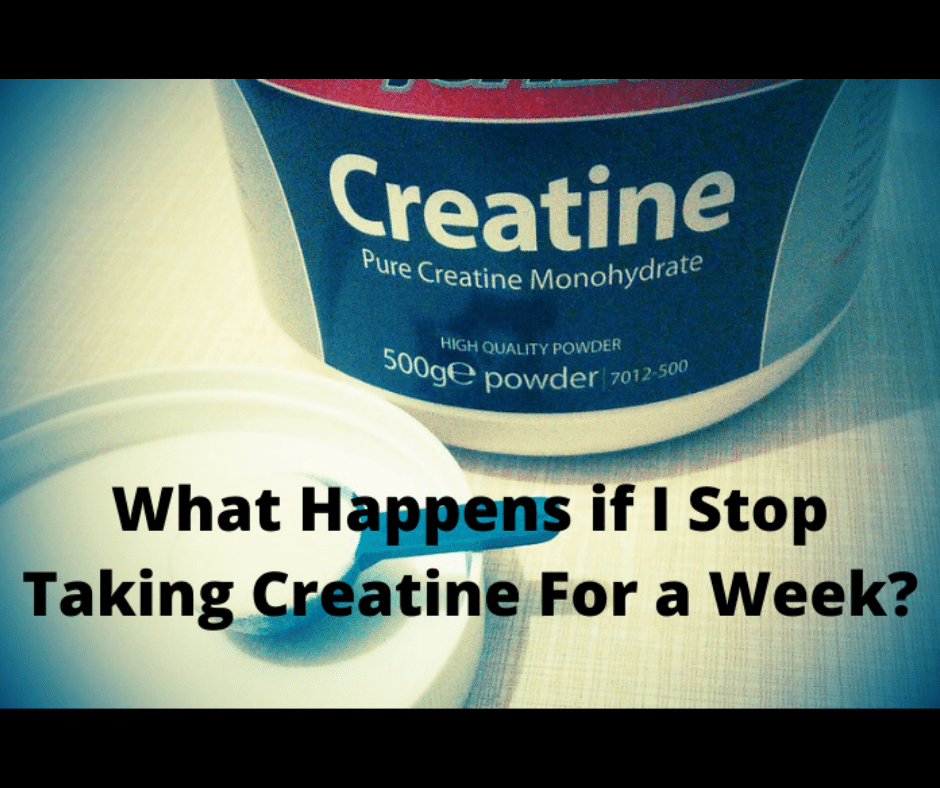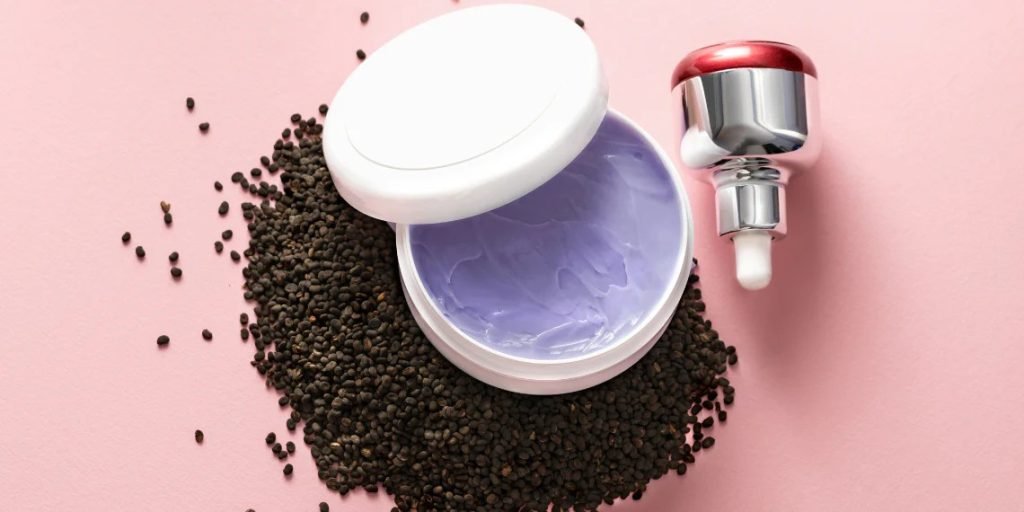[ad_1]
You won’t notice a big difference if you stop taking creatine for a week. Your body and muscles will usually become saturated with creatine after about 3 weeks of supplementing at approximately 5g per day. It also takes up to 3 weeks for these creatine stores to leave the body after you stop using it. So realistically if you stop taking creatine for just one week, the muscles will still have ample reserves. Plus, remember that creatine is produced naturally in muscle cells and is also found in many food sources.
A week is not that long

I will categorically say that if you stop taking creatine for a week, there will be no difference.
In fact, if you “feel” like your energy levels or workouts are suffering during a week off, it’s likely the placebo effect.
The whole point of taking it is to fill the muscles with creatine, which in turn helps the muscles produce energy.
This can certainly lead to better strength and lean muscle gains.
However, it usually takes about 3 weeks of supplementing with 5g per day to fill the muscles with creatine.
This also explains why there is a loading phase, it basically allows you to get there faster.
So the goal is to flood your muscles with creatine and then go back to taking a maintenance dose of 3-5g per day.
Now, the very fact that your muscles are flooded with creatine which means they cannot be depleted of their stores overnight.
In fact, your creatine stores won’t begin to deplete until at least 2 weeks after you stop taking it.
For most lifters who have taken the recommended dosage it will take up to 3 weeks for the creatine stores to completely leave the body.
With that said, depending on the amount you received, this could take up to 4-6 weeks.
In other words, not taking creatine for a week will make very little difference.
You should also remember that muscles naturally produce a baseline level of 1-2g of creatine per day anyway.
Plus, many foods, especially red meat and fish, have high levels of creatine, meaning you can naturally “supplement” through nutrition.
Don’t believe the Creatine Hype
You will often hear that if you stop taking creatine for a day or two, never mind a week, that it will have an effect on you.
Some will say you will lose some weight, which is mostly water weight, as the muscles become less saturated.
Then there are those who claim that their strength has decreased within days of stopping creatine.
There are even people who will tell you that they lose size and muscle within a week.
As I have already mentioned, if your muscles are saturated through creatine supplementation, it will take at least 2 weeks before any form of creatine depletion begins to occur.

So if someone is noticing immediate differences, that’s either the placebo effect once again, or simply that their muscles weren’t saturated with creatine in the first place.
With that said, it is completely ridiculous to claim that you lost size or strength in a matter of days.
In fact, as I’m sure you realize, your gains are actually made outside of the gym while you recover.
So your muscles are repairing themselves and getting bigger and stronger when you’re not exercising.
“The Vacation Effect”
This also explains why you can often return from vacation looking in better shape than when you left.
You knew you were going on vacation and so your training levels went through the roof in anticipation.
In fact, you were close to overtraining.
Then spend a week or two eating, drinking, relaxing, and maybe hitting the hotel gym no more than a few times a week.
And yet you look somehow fantastic.
So anyone who says that stopping creatine for a few days or a week has severely affected size and strength is talking nonsense.
I’ll even go so far as to say that the companies that make and sell creatine will specifically tell you not to miss a day.
To me, this is nothing but marketing hype, just to keep buying and getting more creatine.
Don’t believe the hype.
Should you cycle creatine?
You’ll read so much confusing and conflicting information about creatine that it’s enough to put you off taking it altogether.
And sorry if I’m adding to your troubles.
Once again, there will be people swearing creatine cyclingand those who believe there is nothing wrong with taking it forever.
Really, I think it comes down to personal choice, and also how well your body responds to creatine.
You’ll often hear that you should load up on creatine for a week, take it for another 7-10 weeks during maintenance, and then take a week or two off.
The reason for this is that your body will usually adapt to the supplements, so it’s a good idea to reset everything internally and then go back to taking creatine again.

Then there are people who will tell you that there is no need to cycle creatine.
Well, in reality, there’s no need to stop taking creatine completely (because you’ll still be using it in some way).
This would involve taking a higher dose, say 10g, for about 4-5 days before returning to maintenance levels once again.
In fact, your body has adapted, so you are increasing the levels to literally confuse the body.
I’ve always preferred to adopt a creatine cycle, but that’s just me.
What happens if you stop taking creatine altogether?
Deciding to stop taking creatine brings about a number of physiological changes, especially if your body previously responded positively to it.
It is estimated that up to 30% of people are “creatine non-responsive”, meaning creatine has no effect on them.
So if you’re one of the 30% of people, then stopping creatine supplementation won’t make a blinding difference.

Initially, one of the most obvious effects is the reduction of water retention within the muscle cells.
Creatine has the property of increasing the absorption of water in the muscles, contributing to their fuller appearance and a slight increase in weight.
When you stop taking the supplement, this effect reverses, leading to a decrease in muscle volume and possibly a slight decrease in overall weight due to water loss.
Beyond the immediate visual and weight changes, stopping creatine can affect your performance, especially in activities that require quick bursts of energy or high-intensity efforts.
Creatine plays a crucial role in the rapid replenishment of ATP (adenosine triphosphate), the primary energy carrier in cells, which is especially vital during short, intense physical activities.
Without the extra boost from supplements, you may find a slight decline in your ability to maintain peak performance levels, affecting your strength, power output, and speed of recovery between workouts.
| 🚫 Stop creatine? What to expect 🚫 | |
|---|---|
| Creatine unresponsive | Up to 30% of people see no effect from creatine, so stopping it has no effect. |
| Time to deplete creatine stores | 3-6 weeks for most individuals. |
| Immediate effects | Water weight loss and muscle fullness. |
| Long-term effects | Potential decline in strength and power, affecting gym performance. |
| Brought to you by mybodyweightexercises.com 💪 | |
Your body will eventually adapt
However, the human body is extremely adaptable.
Over a period that usually spans three to six weeks, your body will adjust to the lack of extra creatine.
Natural creatine synthesis within the body, along with dietary sources, will begin to compensate, but not to the levels achieved with supplementation.
This adjustment phase varies between individuals, but eventually leads to a stabilization of performance measures and physical abilities at pre-supplementation levels.
It is also worth noting that the effects of stopping creatine supplementation are not permanent.
If you decide to reintroduce creatine into your regimen, previous benefits such as increased muscle water retention, improved high-intensity performance, and faster recovery can be regained.
This reversible nature underscores the effectiveness of creatine as a supplement and the body’s ability to adapt to dietary changes.
So while stopping creatine supplementation will likely lead to some noticeable changes, especially for those who initially respond well, these adjustments are part of a natural process as the body returns to its baseline state.
Understanding these shifts can help manage expectations and maintain a balanced approach to your fitness and supplementation strategy.
Final Thoughts
So I hope you have a better idea of what happens when you stop taking creatine for a week.
Actually, very little.
It takes at least 2 weeks for your creatine stores to begin to deplete, and up to 3 weeks (4-6 weeks in some cases) for creatine to completely leave the body.
There are many marketing ads that claim that you should not miss a single day of creatine supplementation.
However, once the muscles are saturated, you have nothing to worry about for a while yet.
I recently discussed another popular question when it comes to supplements, namely, is it ok to take creatine without protein.

Hi, I’m Partha, owner and founder of My Bodyweight Exercises. I am a level 3 personal trainer and certified strength and conditioning specialist through the Register of Exercise Professionals, UK. I have been a regular gym goer since 2000 and have been training clients since 2012. My goal is to help you achieve your body composition goals.
[ad_2]







